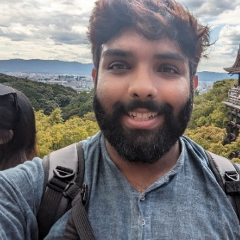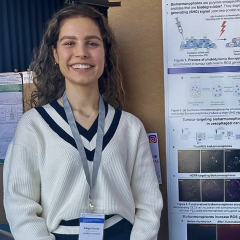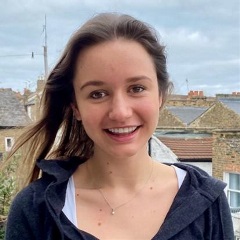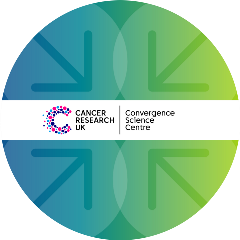
Endometrial Cancer is the most common gynaecological cancer in developed nations. Survival rates are incredibly good in the early stages of the disease but rapidly decrease in patients with advanced tumours. Symptoms of Endometrial Cancer are non-specific leading to only 20% of patients undergoing investigation for Endometrial cancer having confirmed disease. There is a clinically unmet need for a test that can reduce the number of patients undergoing painful and resource intensive investigations thereby reducing healthcare costs and improving peace of mind for patients.
I am currently developing a Lateral flow test device using novel chemistry developed in the Ladame lab. To detect Endometrial cancer, I am utilising a new class of biomarkers: circulating miRNA. These biomarkers display tissue and disease specific profiles and can be quantified to determine not only disease presence. I have been interested in Cancer, detection and treatment since I was young. Previously my focus was on monoclonal antibody treatments of non-small cell lung cancer. My interest on detection shifted after the passing of my grandmother from a rare form of endometrial cancer that went undetected due to its non-specific and atypical symptoms. With better detection and monitoring the hope is that more women will be able to access lifesaving treatments earlier.
I could recite the periodic table in order when I was 12.
I spoke in the house of commons chamber when I was 16.
Now I spend my free time trying to learn languages on Duolingo or getting crushed as white belt in bjj.

Oesophageal cancer ranks as the sixth most common cause of cancer-related death worldwide. Survival rates have remained unsatisfactory, highlighting the need to improve existing therapeutic approaches. In response, my PhD focuses on pioneering a new approach to treat oesophageal cancer using bioharmonophores (biodegradable Second Harmonic Generating nanoprobes). These peptide-based nanoprobes hold great potential to radically improve photodynamic therapy in terms of depth of treatment field, precision targeting and efficacy. Motivated by my aspiration to become a proficient general surgeon, I chose this project with the aim of advancing patient care in the realm of cancer treatment. I hope this novel approach will improve the quality of life of cancer patients suffering with debilitating symptoms such as difficulty swallowing.
I enjoy playing the piano as well as boxing and doing karate in my spare time. I’m also currently training for a half-marathon.

This project involves challenging cancer types that are currently treated with toxic chemotherapy, yet the success rates are low. I was determined to generate a form of immunotherapy that was more tolerable and effective. If successful, these sorts of agents could improve patient quality of life considerably.
I ran a half marathon at 17 years old and a full marathon at 19 years old.
